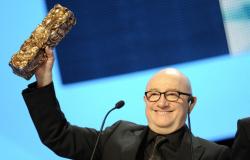A popular actor since the success of “Bronzés” with his friends from Splendid, the tormented Michel Blanc, who died at 72, alternated between laughter and emotion while exploring with finesse, in front of and behind the camera, the human soul.
“You never know, on a misunderstanding, it could work…” For many, he will forever remain Jean-Claude Dusse, the bald and mustachioed scrawny of “Bronzés”, a failed flirt always convinced of being able to “finish”.
If this character, as exasperating as he is endearing, confined him for a time to comic roles with hypochondriac or clumsy roles, the actor had nevertheless proven himself in the mid-70s by filming for Tavernier (“Let the party begin “), Miller (“The Best Way to Walk”) or Polanski (“The Tenant”).
“Evening wear”, the turning point
Above all, after the enormous public success of “Marche à l’ombre” (1984), his first film as a director, the actor knew how to bounce back and broaden his range by disappearing as the first of the Splendid gang.
“People in the street called me ‘mate’ or shouted ‘you have an opening’,” he recalled. “In short, they spoke to Jean-Claude Dusse… It led me towards a career that did not interest me. I no longer stimulated the imagination of the authors.”
He exploded the “glass ceiling” thanks to Bertrand Blier’s trangressive “Evening Wear” (1986).
He plays the moving Antoine, who becomes infatuated with Gérard Depardieu and cross-dresses. The role, crowned with the Best Actor Prize at Cannes, marks a turning point in his career.
Born on April 16, 1952 in Courbevoie (Hauts-de-Seine), Michel Blanc is an only child. Rather modest background with a moving father who ended up as a middle manager and a typist mother who became an accountant. Very loving parents who are overprotective of their son, born with a heart murmur.
Shy, puny, great hypochondriac – “I am the pioneer of hydroalcoholic gel! »–, young Michel quickly loses his hair and will have to rely on humor, sometimes caustic, and self-deprecation more than on his physique.
“I didn’t love myself”
“I have an advantage over late bald people, I have never associated baldness with age,” joked the man who has long felt bad about himself.
Since childhood, he has been passionate about classical music. At the age of 20, he even tried to make a career as a pianist. He devoted six to seven hours a day to it but gave up quite quickly, understanding that he would never be “the new Arthur Rubinstein”.
Change of direction. He joins his group of friends from Neuilly high school – Gérard Jugnot, Thierry Lhermitte and Christian Clavier – to embark on the adventure of the café-theatre within the Splendid troupe.
“As I didn’t like myself, I wanted to play characters who weren’t me.”
“He is a lonely, wounded, disconcerted man,” said his friend, the writer Françoise Sagan. “I am an anxious person who prefers action to depression,” said the person concerned.
Throughout his career, this hard worker and perfectionist knows how to use his complexes and his writing talent to explore disenchantment and shape the characters in his films, particularly those he directs like “Gross Fatigue” ( 1994) and “Kiss Whoever You Want” (2002).
He is convincing in the dramatic register, portraying the disturbing “Monsieur Hire” (1989), according to Simenon, or a homosexual doctor at the onset of AIDS in “Les Témoins” (2007) by André Téchiné. Or on television in “The Dominici Affair” (2003).
Discreet about his private life
After the missed appointment of the third opus of “Bronzés” in 2006, Michel Blanc, nominated four times for the César for best actor, won the precious statuette in 2012 for his unexpected second role as chief of staff in the political thriller “L’ Exercise of the State”.
The actor, who also has a successful career in the theater, has always remained very discreet about his private life: “Our work is our very person. If we expose our privacy, we become a celebrity, we are no longer an actor,” he confided to Télérama in 2007.
“Knowing that your mechanic is gay or straight doesn’t change anything about your appreciation of his work,” he added. “For the actors, on the contrary, this knowledge is a confusing factor.”
frd/ber/fmp/may/bow






